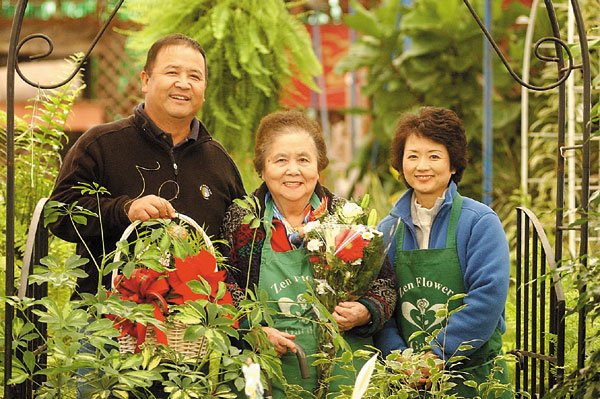Beset by tragedies, Uchida family pulls together
By Emily Alpert Staff Writer
Gilroy – Frigid rain skitters across the plastic roof of the Zen Flower Garden, newly re-opened. Pale, trembling orchids hold their own against the chill. As Ted Uchida tries to lift a potted plant, he struggles, then begins to laugh. In the months the shop sat closed, the plant has anchored itself to the ground, snaking green tendrils into the soil.
“I have to be positive,” Ted jokes. This year, “we didn’t have much choice!”
It’s December, but for the Uchida family, it feels more like May. Nine months after Zenichiro Uchida’s death, a near-year blotched with illness and heavy with trauma, the chill is fading, and regrowth seems possible once again.
On March 30, cancer plucked Zenichiro Uchida from the earth like a rare, near-mythic flower. Thousands called him ‘Godfather’: the magnetic man who won more than 1,000 Japanese immigrants a place in the U.S., penning letters and persuading lobbyists with the force of his vision.
“When he spoke,” said Bob Uemura, a family friend, “you listened.”
Uemura was a child when his family crossed the ocean to California. He recalls Zenichiro visiting his family in Southern California, where they worked picking grapes before Mr. Uchida urged them northward, to Salinas, where he saw wealth amid the flowers. To have brought 1,000 Japanese to the U.S. would have been achievement enough for any man, but Zenichiro nurtured each family, showering them with new opportunities, coaxing them towards success like the seedlings in his flower shop.
“To me,” said Uemura, “he was God.”
Like a god, he was both revered and despised. Praised by the thousands of Japanese immigrants, like Uemura, who owed their livelihoods to him; blamed by those left behind. Like Oskar Schindler, savior of German Jews, his biggest regret was not being able to bring more.
“To Mr. Uchida,” said Uemura, “all the kids he brought to this country were his kids.”
Sometimes, Ted and Tomiko resented sharing their father, felt shortchanged of his attentions. As a small child, Ted sometimes couldn’t recall his father’s face, as Zenichiro flitted in and out of the house, of the city, even the country. Later, Tomiko, his sister, was adopted by a childless friend, a man who’d assisted Zenichiro in his quest. It was a sacrifice, said Uemura – but the Uchidas were used to sacrifice.
Shizuko, his wife of 57 years, was the silent partner in his work. Zenichiro was a public man; Shizuko shied from the spotlight. She’d grown used to his absences, when his visions pulled him from Gilroy to do greater things. But when Zenichiro died, she crumpled, like a flower stung by the frost. She’d lie awake until dawn one night, then refuse to rise for days. Eating disgusted her, and she turned from the kitchen, where she’d once prepared miso soup, fish and steaks.
“It was a shock to me,” said Ted’s son Jeff Uchida, a student at Gavilan College. “She was such a happy person. At the greenhouse, you’d see her moving around, making basket arrangements, always smiling. Her voice changed. I’d never seen her depressed before.”
Illness compounded the pain. Shizuko underwent surgery for a pacemaker, and later was diagnosed with uterine cancer. Five doctors attended to her; the family visited her at two hospitals. For Ted, those four months felt like a year. They closed the flower shop, to attend to Shizuko. Blossoms sat idle behind its locked gate.
“They put everything on hold to care for her,” recalled Uemura. “Ted told me, ‘If we don’t open, that’s fine. My mom is my number one priority.’ ”
It was summer, but for the Uchidas, it felt as bleak as March. Then news came of a staggering honor: the Order of the Rising Sun, Gold and Silver Rays medal, awarded by the Emperor of Japan to Zenichiro, after his death. The medal is Japan’s highest civilian award. What’s more, Nobutaka Machimura, the former Foreign Affairs Minister, on the short list for Japan’s next Prime Minister, was coming to Gilroy to pay his respects.
At the same time, Jeff began to find handwritten messages, wedged into the fence outside the darkened flower shop. On his way home from night classes at Gavilan, he found them, scrawled on napkins and note-cards, wishing the family well.
“Then, I started having the right frame of mind,” said Shizuko, as translated by Ted. “I woke up. I wanted to make sure everything was first-class” for Machimura’s visit.
It was like magic, said Ted, as if fate had flipped a switch. Her eyes grew bright. Her step quickened. The smell of meats frying, soups taking shape on the stove, filled the house once more.
“It was like going from a nightmare,” said Makiko, Ted’s wife, “to a beautiful dream.”
Months later, in December, the Uchidas gathered to see Zenichiro’s tombstone, now complete. Rain dripped from the edges of a tent, raised over the family, as they laid fragrant incense on the stone. A lone ray of sunshine chiseled through the clouds, illuminating the shrine. Ted can’t explain it, but in that moment, he says, it felt like his father was saying goodbye.
“Then my mother said, ‘I want to go back to work now,’ ” he recalled.
The shop reopened quietly last Wednesday. Sales are slow. Normally, poinsettias blanket the shop’s floor, come Christmas: this year, the red-leafed plants are scarce. But it’s not about the money, says Ted.
“I used to think my parents’ place was just a shop,” said Jeff. “I didn’t think it was anything special. But I’ve realized – it’s not just a shop, it’s my parents’ way of life.”
As Ted speaks of his father’s legacy, his love of peace, his insistence on always being “first-class,” Shizuko and Makiko chatter near the register, over Styrofoam cups of tea.
Just like always.
“Nothing dramatic has changed,” said Jeff – and that’s a good thing.
Christmas isn’t a big holidays for the Ushidas, even in an ordinary year. This Christmas, because of Zenichiro’s death, they won’t give cards or gifts: a Buddhist custom. But New Year’s brings them to the same table, sharing Shizuko’s roast beef dinner. And other traditions continue unbroken: Gilroy’s Sister Cities program with Takko-Machi, Japan, initiated decades back by Zenichiro. The high school choir’s yearly trip to Japan, another Uchida project. And the daily practices of peace, of brokering between cultures near and far, that Zenichiro bequeathed to his son.
“I didn’t know the war,” said Ted, “so I don’t have the urgency that my dad did. But I understand. Once, we were farmers. We became lawyers, doctors, multimillionares. You become content with life, and do nothing. But that’s not why my dad brought them here.
“We’re meant to be a bridge,” he said. “To broker peace. Because if you don’t do anything, peace won’t wait.”













